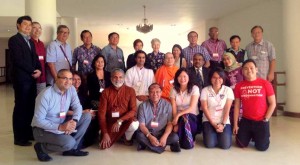CCA hosts Asia's Interfaith Network Conference on HIV and AIDS

Asian Interfaith Conference on HIV and AIDS attended by representatives of Faith Based Organizations (FBOs) in Asia is being engaged in a biennial process of mapping out HIV and AIDS programs and services that different FBOs are implementing in various Asian countries.
Organised under the auspices of the Asian Interfaith Network on AIDS (AINA) and hosted by the Christian Conference of Asia ( CCA), the Asian Interfaith Conference meets at the Payap University , Chiang Mai, in Thaliand on 15.16 Janaury 2016.
The conference brings together about 30 leaders from diverse faith communities and representatives of UNFPA and UNAIDS. While assessing the commitments and gaps regarding the work on HIV andAIDS, the Conference also aims at developing new strategies and methodologies to enhance the cooperation among the interfaith network in Asia.
While welcoming the participants and extending greetings , the General Secretary of CCA Dr Mathews George said that, “CCA is committed to continue to support these kind of interfaith initiatives addressing the concerns on HIV and AIDS. The new program structure of CCA has placed the HIV and AIDS advocacy as a priority are as part of the Prophetic Diakonia and Advocacy program area”.
The CCA General Secretary added that “CCA wants a genuine sense of ownership by all partnering organizations for effective advocacy and there is a need to systemize the approach in terms of advocacy in this area”. .”
Venerable Phra Maha Boonchuay Dooji, Chairperson of AINA said in his introductory remarks that , “ as a Buddhist monk in Thailand, it is difficult to collaborate with other faiths in many areas, but my personal interest and commitment to foster good relations with other faiths is the reason to work in this area.” Mr. Roy Wadia from United Nations Population Fund in Thailand stated that faith communities often oppose this kind of work as sex is something most people don’t feel comfortable to openly talk about. Hence having a conference on HIV/AIDs inviting Asian faith communities and Interfaith Networks is timely.
The establishment of AINA as a network of various faith based organization was initiated by CCA in 2005 during an international consultation on HIV and AIDS was organised by CCA with the participation of interfaith leaders from various Asian countries.










